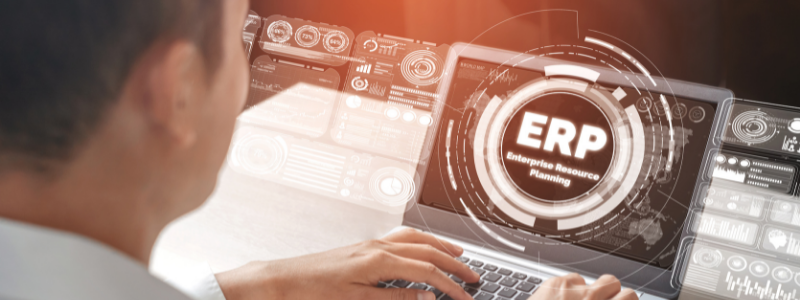Why Would A Company Choose To Implement An ERP?
As your company grows, so does the number of platforms and systems, to stay as efficient, productive, and profitable as possible. Growing pains do exist, however, as you discover that not all of your platforms and systems are universal between all resources and departments. So, why would a company choose to implement an ERP solution?
Well, there are a few reasons why deciding to integrate to an ERP, but being able to manage all internal and external resources under one system is why so many businesses choose an ERP. However, choosing the right ERP system really depends on your business situation and needs.

What is an ERP?
ERP (Enterprise Resource Planning) is a software system that helps companies manage their business operations, such as manufacturing and distribution.
The main goal of an ERP implementation is to improve the efficiency of the company by automating processes, streamlining workflows, reducing costs, and increasing productivity.
Small-to-medium-sized enterprises (SMEs) are increasingly becoming aware of the exemplary benefits that an ERP system has to offer in improving operational efficiency in all areas of a business.
With ERP systems becoming a leading solution to achieving competitive advantage for SMEs, it is imperative that they understand why and how these systems can benefit them.
This article explores the reasons why companies would choose to implement an ERP system. It will also provide some information on what type of ERP system we recommend for your business.
What Does an ERP System Do?
An ERP (Enterprise Resource Planning) system is a computer-based application used to help businesses manage their day-to-day activities by providing seamless integration.
These applications are designed to automate many manual tasks and allow users to access data from any location at any time to provide operational efficiency. All areas of a company stand to benefit from the implementation of an ERP system as the system aims to:
- Improve internal communication between departments
- Reduce errors
- Streamline workflow
- Increase productivity
- Provide better customer service
- Save money and time
The following sections explore some of the key features of an ERP system and how they can benefit you.

Why Implement an ERP System?
So, exactly why would a company choose to implement an ERP?
While not every company needs an ERP, implementing an ERP system will most certainly help improve internal (and external) business processes. Here are some reasons you would want to introduce an ERP software solution to your business:
Productivity
The ability to track sales orders, inventory management, production scheduling, and other related functions. This allows employees to focus more on core business activities.
An increase in levels of productivity can take a company from 0 – 100. An increase in productivity is one of the biggest advantages of implementing an ERP system. Increased productivity works to not only improve efficiency, employee satisfaction but also a higher quality output.
Efficiency
Automation of manual processes reduces the amount of time spent performing repetitive tasks. This results in increased efficiency and improved quality control.
An increase in efficiency in every department can result in short-term benefits of reduced operating expenses and long-term benefits of increased profits. Additionally, the automation of manual processes works to improve the standardization of business practices which ultimately improves the overall quality of products and services.
Communication
A common problem faced by small businesses is poor communication between different departments within the organization.
By using an ERP system, this issue can be resolved through the use of integrated tools which improves the interaction between staff members. The ERP system allows for easier collaboration between teams and departments which in turn increases the level of transparency and accountability.
Customer Service
Customers expect a high level of customer service from businesses.
With an ERP system, customers have the opportunity to view real-time status updates and receive notifications when there are delays or issues with their orders. This increases customer satisfaction and loyalty.
Cost Savings
A reduction in human error and process inefficiencies means less waste and cost savings. The implementation of an ERP can reduce human error through automation and standardization of procedures.
Business Intelligence
Business intelligence (BI) refers to the use of software tools to collect, analyze, and present data about a particular organization.
BI helps organizations gain insight into their operations and performance. For example, BI can be used to monitor sales trends and identify potential problems before they occur.
Security
With all of the new technology that is available today, security is becoming increasingly important.
An ERP system is able to integrate with various technologies such as mobile devices and cloud computing. This means that it is possible to securely store information and share it across multiple locations.
Data Management
ERPs offer a centralized database for storing and managing large amounts of data.
This makes it easy to keep up to date with current information and ensure accurate data entry. The benefit of data management also expands into reporting capability. Improved reporting capability allows managers to see real-time performance metrics and trends within the organization. This can assist with decision-making and planning.

What Industries Should Use An ERP?
There are many different types of companies that would benefit from having an ERP system. Some examples include:
Manufacturing Companies
Many manufacturing companies rely heavily on their supply chain to maintain profitability.
Having an ERP system will help them manage this aspect of their business. It will provide visibility into where products are coming from and how they are being processed. This will help them stay competitive by reducing costs and improving product quality.
Retail Stores
Retail stores need to be able to quickly respond to changes in demand.
They must be able to accurately forecast future demands and then meet those needs. An ERP system will allow retailers to better understand what is happening in each stage of the supply chain. This will enable them to adjust their strategies and make adjustments as needed.
Financial Institutions
An ERP system will give financial institutions the ability to track transactions and perform analysis.
This will help them determine which areas of their business require improvement and which ones are doing well.
Healthcare Organizations
Healthcare organizations often deal with sensitive patient information. An ERP system provides a secure way to store and access this information. This allows healthcare organizations to improve efficiency while maintaining compliance standards.
SAP Business One: The Best ERP Solution
SAP Business One stands to be a leading option of ERP systems for improving any company’s processes.
Support One provides an exceptional service that includes training, consulting, maintenance, and support.
SAP Business One offers a wide range of features including inventory management, purchasing, production scheduling, accounting, human resources, customer relationship management, and more.
So, why would a company choose to implement an ERP? Increasing efficiencies between resources and departments, under one single system.
If you’re looking to combine all of your business tools into one simple, universal system, Support One can help.
Get in touch with us today, to help implement an ERP that’s right for your business needs.










